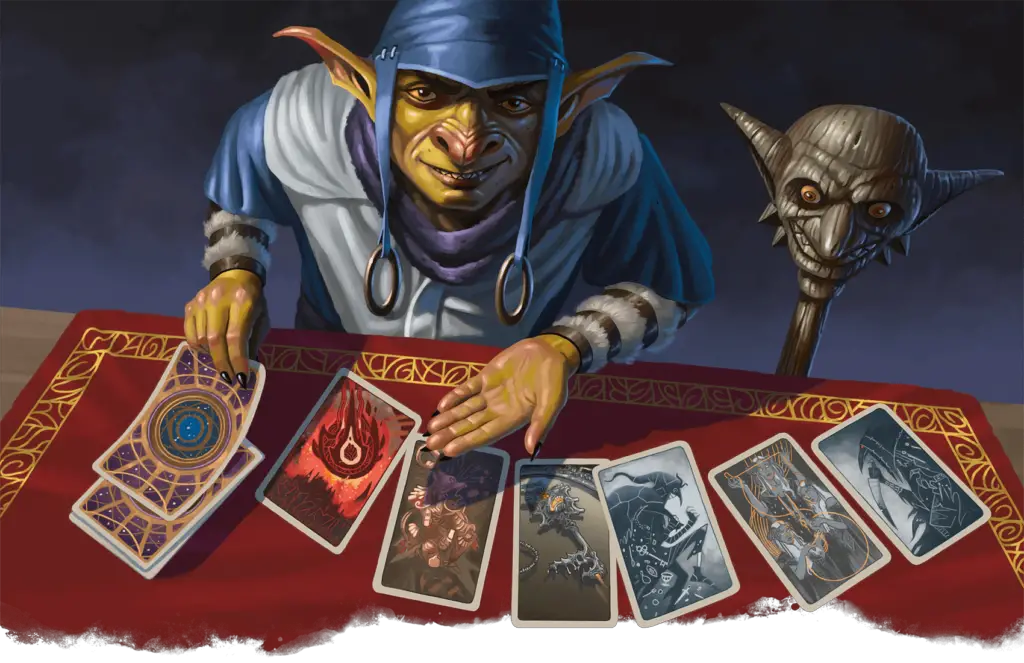“Sleeping Beauty” by ilona-veresk, CC Attribution-Noncommercial-No Derivative Works 3.0 License.
Disclaimer: This article contains affiliate links that add gold to our coffers.
One of my favorite D&D 5e spells is Dream. In this article, you’ll find creative uses for the spell that can shape your worldbuilding with its implications. I’ll give an overview of the Dream spell before going into the creative applications, countermeasures, and other considerations.
You can watch the video version of this article if you prefer to listen:
Let’s begin with dissecting the spell’s description:
Dream – Player’s Handbook p.236
|
Dream |
|
5th-level illusion
Casting Time: 1 minute This spell shapes a creature’s dreams. Choose a creature known to you as the target of this spell. The target must be on the same plane of existence as you. Creatures that don’t sleep, such as elves, can’t be contacted by this spell. You, or a willing creature you touch, enters a trance state, acting as a messenger. While in the trance, the messenger is aware of his or her surroundings, but can’t take actions or move. If the target is asleep, the messenger appears in the target’s dream and can converse with the target as long as it remains asleep, through the duration of the spell. The messenger can also shape the environment of the dream, creating landscapes, objects, and other images. The messenger can emerge from the trance at any time, ending the effect of the spell early. The target recalls the dream perfectly upon waking. If the target is awake when you cast the spell, the messenger knows it, and can either end the trance (and the spell) or wait for the target to fall asleep, at which point the messenger appears in the target’s dreams. You can make the messenger appear monstrous and terrifying to the target. If you do, the messenger can deliver a message of no more than ten words and then the target must make a Wisdom saving throw. On a failed save, echoes of the phantasmal monstrosity spawn a nightmare that lasts the duration of the target’s sleep and prevents the target from gaining any benefit from that rest. In addition, when the target wakes up, it takes 3d6 psychic damage. If you have a body part, lock of hair, clipping from a nail, or similar portion of the target’s body, the target makes its saving throw with disadvantage. |
Who Can Cast Dream?
Dream is available to Bards, Warlocks, Wizards, and special Druids who are of the Circle of the Land (grassland) and Circle of Dreams. One minute of casting time gives you an eight-hour duration (no concentration) to tamper with a subject’s dream.
Due to its lack of damage or readily evident utility, I suspect many D&D players initially judge this spell to be underwhelming for a fifth-level spell. I can convince them otherwise. Dream is a ‘sleeper’ spell that has been waiting for years to be understood. Let’s explore the possibilities and applications together…
“Dreams feel real while we’re in them. It’s only when we wake up that we realize something was actually strange.” – Inception
Top 11 Ideas for Casting Dream in D&D 5e
These are my favorite concepts to utilize Dream with my own spellcaster character, worldbuilding, and DMing. I hope you find ideas that inspire you so you can enrich your game! Players, choose Dream and try to make a world-shifting difference in your game with it. DMs, learn how Dream can be used to interact interestingly with your player characters.
This list is in no particular order.
1. Planting and Extracting Ideas
The plot of Inception involves a plot to plant an idea in the mind of a powerful businessman through his dreams. The trick is to make him believe that he organically developed the idea himself. Dream can be used for similar purposes. Numerous possibilities exist if you’re willing to put in the time and effort. You could target a powerful priest to plant an idea that his apprentice is trying to kill him. Targeting a lord of the land to convince her that her husband is having an affair could be fun. Whether or not the divulged secret is true does not matter.
Planting
The point is that you can seed distrust between your enemies and their loved ones. I imagine a dream where the Dream target finds an incriminating item under a bed or in a drawer. When they awake, their curiosity draws them to that location to find the very item they dreamed about because you planted it there.
Extracting
The Dream spells environmental creation and manipulation in incredibly realistic. The dreamer could feasibly believe they are actually awake, priming the dreamer to reveal secrets within the dream. Instead of meeting them in the real world to negotiate or intimidate them, you can create a scenario where they feel it is necessary to divulge information. Alternatively, you can attempt to plant an idea in the subject’s head that will steer their actions in reality.
Consider the tone for dreams of this nature. Do you want to scare them or lull them? A stressful dream could put a dreamer in a frenzy, causing them to reveal secrets or play out how they would react to a given scenario. However, a dream could also be a positive experience. Dreamers in a state of bliss could drop their guard. If you don’t reveal yourself in the dream, you could even make it obvious that they’re dreaming in hopes of them revealing their true selves or other secrets while they feel their actions have no consequences.
Targets with rocky marriages might do anything in a dream to repair their marriages. A parent who has lost a child would do anything to get their child back. You can facilitate these cathartic moments if you have the stomach for manipulation of this magnitude.
“What is the most resilient parasite? . . . . An idea. Resilient, highly contagious. Once an idea has taken hold of the brain it’s almost impossible to eradicate.” – Inception
2. Dream Entrepreneur
Every person has a fantasy of some sort. Fantasies are often played out by the subconscious mind within the dream state. Waking up can be disappointing. The movie Inception showcases this idea when the character Yusuf is introduced. Yusuf provides a paid service to paying customers. He sedated customers and facilitated lucid, shared dreams. The men in this scene are explained as daily customers who prefer to dream than to be awake, and it is supposed that feeding their dream addiction in this way has removed their ability to dream naturally while sleeping, enforcing a reliance on this method of dreaming.
Because Dream is a fifth-level spell, you can bet it is rare; the rules of supply and demand come to mind. There are plenty of wealthy people who would pay money to experience their fantasies in dream form, especially if they can recall the dream with perfect clarity as the spell describes. Perhaps they fantasize about becoming a ruler. Maybe their fantasies are more lustful or wrathful. Whatever it may be, you can mold dreams into up to eight hours of pure ecstasy for a paying customer.
Maintaining Clientele
Your clients could sign up for regular dreams to take place weekly, and you just have to prepare the Dream spell for that day. I bet it won’t take long for you to have your calendar fully booked with dream appointments. The only requirement would be to meet your clients so you can fulfill the spell’s requirement to be familiar with the dreamer. If your time is too valuable to spend on the dream experience for eight hours, you can have a follower be the Dream’s messenger while you go about your business.
Some clients may have particular tastes that could be satisfied only by a dream architect with particular skills. If your character is a bard, you could fill their dreams with rhapsodies, melodies, or marvelous dance parties. Your ability to enhance the surreal realism of a dream is only limited to your own lucid creativity and clever capability.
How much would you charge for a tailored dream? The nobles will pay a pretty penny. The paupers will come in droves if the price is right. Be careful not to push men to desperate addiction; your clients could turn to crime to fund their dream addiction. The city guard’s watchful eye could eventually turn to you.
“They come here every day to sleep? . . . No. They come to be woken up. The dream has become their reality. Who are you to say otherwise, sir?” – Inception
3. Assassination or Harassment
An interesting part of this spell’s description involves an option for the messenger to adopt a monstrous appearance in a dream to force the target to make a Wisdom saving throw, risking 3d6 psychic damage and an inability to benefit from rest. This is such a unique effect! Imagine carrying out an assassination by plaguing dreams each night to terrorize targets into restless madness. With repeated castings, targets may eventually reach the sixth level of exhaustion, resulting in death if the DM enforces rules for Constitution saving throws to avoid or succumb to sleep deprivation.
Dream even has an element of voodoo. Obtaining a lock of hair, clipping from a nail, or a similar portion of a target’s body will cause disadvantage on their wisdom saving throw against Dream. Even if you don’t want to kill someone, you can harass them every time they sleep. Your target could attempt a long rest after they fail their saving throw. Long rests also don’t technically require sleep, so you’ll need to be persistent if you aim to harm. The threat of harm may be enough, however, to prompt the target to surrender information.
4. Terrorism
Dream is a strong candidate for major political powers to outlaw or mark taboo. A terrorist with Dream could spark a host of hostilities between rival nations as they attempt to identify the caster and blame particular countries for the psychic attack. A player character may discover trouble if they practice forbidden magic like Dream. This spell sows distrust in anyone who knows a spellcaster that can use it.
5. Spy Network and Communication
If you are a spy or a handler for a spy to report to, what better way is there to meet and discuss secrets than in the safety of your own dreams? You would not require words to pass information along, creating the environments, people, and objects of interest in the dream itself. Remember, Dream allows the dreamer to recall a dream perfectly (an effect not to be overlooked). I recently used Dream to perfectly learn the layout of a fortress from our spy on the inside.
As long as you are familiar with your fellow spies, you can cast Dream to rendezvous in the dreamscape away from listening ears. These messages are immune to interception. You could easily become the coordinator of a nationwide rebellion or network of spies, coordinating across the entire plane of existence without a trace of your organization’s existence.
6. Snooze School
Dreams can be an excellent place to teach and learn. Teachers and students can use the dream can become the perfect place to teach. Teachers can utilize unlimited resources and save time by molding the dream.
A combat pupil could learn how to fight. One challenge for learning to fight is the danger of it, so a dream can be a safe place to learn fighting skills. Fighters can die over and over again in the dream, only to be psychically reborn and try again.
A wizard could teach an apprentice to use simple spells in a dream. Expensive material components are not needed in dreams, so the apprentice would only need the proper wealth and time during waking hours to copy a spell to a spellbook. Remember, Dream’s description says the target can remember the dream perfectly. Even a complicated spell can be jotted down by memory if the apprentice learns the spell in this dream state.
7. Sleep Test
Could it occasionally be useful to cast this spell to see if someone is asleep when they’re supposed to be? This scenario is conceivable but uncommon. Dream’s description clearly explains that you will know if the target is asleep or not, allowing you to wait until they fall asleep if they’re awake when you cast the spell. Maybe it’s overkill to use this to test if someone is asleep, but it’s an option!
8. Overcome Reality
Dream is not limited by language or intelligence as other spells are. Many spells are limited to humanoids that can speak a language, but Dream can target any creature familiar to you. For example, I play in a game with a player who has grown attached to a siege beast. She always makes sure this beast is nearby and in good care. A Dream spell could allow her to enter the dreams of this beast as a bonding experience. Perhaps they’d frolic through dream clouds together, but I imagine they’d be storming castles and dealing out death.
9. Therapy, Play, and Dating
You can become a couples’ counselor as you allow one spouse to be the messenger of the spell to show their spouse a good time. You can also allow people to face their fears or experience serene environments to deal with their trauma. I’m not a therapist or anything like that, but you can essentially create a safe hologram room for someone to face their demons head-on.
Dream works like modern virtual reality. You can help people meet each other and go on dates while they sleep. Not only is this a safe way to go on a date, but it’s also time-effective. People can be busy with work, children, or adventuring during the day. Why not put the sleeping hours to work by meeting someone new?
10. Evil Plot (The Matrix, Infinite Tsukuyomi)
The Naruto series culminated with a godlike entity that sought to put all people to sleep in an infinite dream. The Matrix movies involve people who are put to sleep while their energy is harvested for machines. If a big bad evil guy discovered a way to apply the Dream spell in bulk to massive amounts of people, it would be a weapon of mass destruction. One idea that comes to mind is a machine invented by mind flayers to allow them remote access to the delicious psychic energies of living creatures that fall asleep. The mind flayers would create a dystopian world where everyone was afraid to sleep anywhere except within the dome created by Leomund’s Tiny Hut. There would probably be a city that had a Massive Leomund Hut to protect it; perhaps it’d be the last real city of mankind that existed.
11. Beholders and Matter Manipulation
To explain this, you’ll need to know about Beholder lore regarding dreams. Basically, a Beholder’s dream can become reality. This is the common way for a new Beholder to be created. Beholders are paranoid, always expecting that others want to kill them, even other Beholders. If you can cause a Beholder to dream about another Beholder, the new Beholder will become real within a few miles of the dreaming Beholder. If you do this, you may pit them against one another, and then you can swoop in to end them both when they’re weakened.
I’m not sure what the limits are to what Beholders can create from dreams, but I wonder if your DM would allow a Beholder dream to create treasure… Just remember you must be familiar with the Beholder you target with the Dream spell, which isn’t likely in my experience.
To learn about Beholders, I recommend reading about them in Volo’s Guide to Monsters or watching these excellent lore videos by MrRhexx:
12. Imprisonment and Collective Knowledge Repository
This amazing idea came from a YouTube comment on my video about the Dream spell. The commenter is a user named princevesperal:
“The spell Imprisonment has the ‘slumber’ option, whereby the target is asleep forever, without aging or needing to breathe or eat. Such an individual could become a sort of repository for knowledge: visited regularly by mages who pour entire libraries worth of information into the dreams of that person (who will have perfect recollection thereof) or cast Dreams to come ask him questions.
If your DM rules that multiple castings of Dream allow more than one caster at the same time in the target’s dreams, then it could become a safe meeting ground for enemies to have a chat face to face, negotiate a truce, etc. No harm can be done, no tricks can be pulled, everyone’s localisation remains secret. And the sleeping target is just playing host to those high-stakes encounters in his dreams.”
Peripheral Considerations
Let’s shift gears to talk about how you can counteract a pesky Dream caster. These are the kinds of considerations that would strongly affect your worldbuilding if you allow Dream to be common enough.
Countermeasures
Is this spell unstoppable? Not quite…
Countermeasures (depending on DM interpretation) may include the eighth level spell Mind Blank or a Ring of Mind Shielding. Forum contributor LeonBH has useful ideas for how to prepare for and counter a Dream spell in a discussion on giantitp.com. Countermeasures can be circumstantial depending on the cleverness of the spellcaster using Dream or the lack of knowledge of the victim, but these are generally good points:
“Spells that can counter Dream include Leomund’s Tiny Hut and Mordenkainen’s Magnificent Mansion. A Contingency spell to cast Dispel Magic as the contingent spell could remove Dream whenever it’s cast on you. Targets of the Dream spell can cast (or can hire someone to cast) a Scrying spell to trace the attacker, guided first by various castings of Augury, Divination, and Commune to gain more information about them.” -Giantitp.com – Thread: ‘Dream’ Spell: Surprisingly Worldbreaking? 2017-03-26, paraphrased
Too Many Cooks in the Dream
You might have rival dream architects vying to enter the same dream that you’re targeting. The Dream spell does not specify what would happen if two casters tried to form the dream of the same target. The PHB specifies, “The effects of the same spell cast multiple times don’t combine,” so dream hacking is first-come-first-serve.
I recently entered the dream of a duchess in-game and found a Mind Flayer was psychically influencing her while she dreamed. This lead to a dream duel and the eventual confrontation of the Mind Flayer in the waking world.
Sleepless Races
The PHB describes races that players can choose for their characters. Many of these descriptions include a summary of what a particular race may dream about. Some races have abilities that prevent Dream from affecting them. The PHB also mentions that warlocks are specifically mentioned to commonly have dreams as a communication channel with an otherworldly patron. Dreams are a big part of life for characters, and DM’s commonly use dreams to provide exposition and direction. But not all characters can be affected by a Dream spell.
The Elves and the Warforged do not ‘sleep’ in the traditional sense. Elves technically have a form of dreaming, but these races are still specifically immune to the Dream spell.
Depending on the setting, the Elves and the Warforged races could be trusted with more knowledge than other races due to their immunity to Dream. Elves are especially good secret keepers as they have immunity to magical sleep and advantage to resist being charmed.
Illusionist: Illusory Reality
It is intriguing to consider how the Dream spell would interact with the illusionist wizard’s level-fourteen ability Illusory Reality:
You have learned the secret of weaving shadow magic into your illusions to give them a semi-reality. When you cast an illusion spell of first level or higher, you can choose one inanimate, non-magical object that is part of the illusion and make that object real. You can do this on your turn as a bonus action while the spell is ongoing. The object remains real for one minute. For example, you can create an illusion of a bridge over a chasm and then make it real long enough for your allies to cross. The object can’t deal damage or otherwise directly harm anyone. (PHB 118)
Does Illusory Reality interact with Dream, or does it not apply? I’m genuinely curious what others think of this. Could you coax a dreamer to picture something secretly known only to them, allowing you to materialize that object in the real world on a table next to you for one minute? Could you harm a target in the dream by making a knife ‘real’ and stabbing them with it in the dream? It seems to me like Dream and Illusory Reality do not mix, but I could imagine other gamers interpreting this otherwise. What do you think?
Warlock Invocation: Aspect of the Moon
With this invocation, a character no longer needs to sleep, granting immunity to the Dream spell. When I consider the power of Dream, this invocation suddenly seems more tempting. I wouldn’t say warlocks are trustworthy, but this invocation gives warlocks protection from Dream similar to the Elves and the Warforged.
Waking up
Dream does not prevent a target from waking up. It also doesn’t clarify what happens if the target wakes up and then returns to slumber during the same Dream spell duration; I would rule that you can still enter their dreams if the messenger does not choose to end the spell during the time the target spent awake. I recommend talking to your DM about it. It’s also unclear about what it would take to take up during Dream. Maybe the target is trapped in the dream, but maybe your DM would just have the target wake up (I would feel cheated).
Conclusion
Your DM will appreciate a heads up if you plan to use this spell. It’s amazing for sharing information, facilitating communication, and terrorizing psychically. Let me know if this spell has appeared in your games and how it went. I hope you’ll consider Dream on the next occasion that you choose a fifth-level spell. If this article inspired you to use Dream, please return to let us know how it went!
And remember…
“You mustn’t be afraid to dream a little bigger, darling.” – Inception
If you enjoyed this analysis, check out our other spell analyses:
https://www.flutesloot.com/category/spells/





How does Tiny Hut block the Dream spell?
Hi Oletoker,
While open to interpretation, it’s because of the spell text for LTH that reads, “Spells and other magical effects can’t extend through the dome or be cast through it.” If your DM thinks of this as a physical limitation rather than a more intangible limitation (like for a Dream spell), LTH may not stop Dream’s effect. You can get a feel for how your DM would rule it by seeing if your DM would allow someone to cast an illusion spell from outside the dome to create an illusion inside the dome.
How would you rule it? 🙂
Hmm. Food for thought. Pretty sure I’d let it pass through Tiny Hut
I like your style, friend.
I’m just going to do it to protect my party member from nightmares and be with them in the dream.
That’s a great way to use it to help your friends!
Assuming that the GM allows it, Illusory Reality only lasts for a minute, so your timing would have to be spot on, and it might be suspicious if they saw the knife disappear.
Yes, it requires planning.